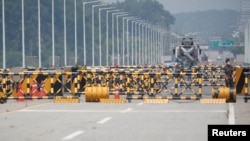A U.N. investigator is calling for an end to North Korea's international isolation, warning continued exclusion will prolong the country's worsening human rights violations.
U.N. investigator Tomas Ojea Quintana said in his report, submitted Monday to the U.N. human rights council, that North Korea locked itself away from the rest of the world at the start of the COVID-19 pandemic in 2020. He said this complete isolation has coincided with a new cycle of missile tests and tensions on the Korean peninsula.
Quintana believes the ongoing deterioration of the country's human rights situation is linked to its ever-increasing isolation from the international community. He said a new cycle of escalation in tensions on the Korean Peninsula could rapidly and dangerously destabilize the region.
"The current situation in Ukraine and other armed conflicts reminds us of the devastation brought about by war," he said. "In my view, a diplomatic approach towards peace and denuclearization on the Korean Peninsula, which build upon previous negotiations and is combined with proactive engagement on the human rights situation, is the only way forward."
Quintana said the government's oppressive control of the population has tightened under the country's COVID-19 border shutdown and travel restrictions. He added that the government of President Kim Jong Un has instituted many draconian measures, such as a system of arbitrary detention without fair trial guarantees, to maintain effective control of the population.
"There is widespread fear of arbitrary arrest and mistreatment in detention, especially for those forcibly repatriated, including detention in Kwanliso, the political prison camps," Quintana said. "These political prison camps represent the worst excesses of a system of governance that systematically violates the human rights of its people."
Quintana said chronic food insecurity is widespread, affecting 41 percent of the country's population, and malnutrition remains a leading cause of maternal and child mortality. If the current situation persists, he warned, vulnerable populations may face acute hunger and starvation.
The U.N. expert's pleas for the government to enact policies to improve the dire condition of its people fell on deaf ears. North Korea boycotted the meeting.




